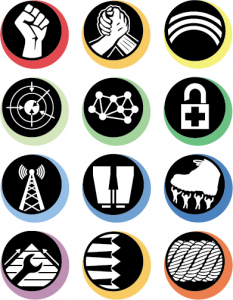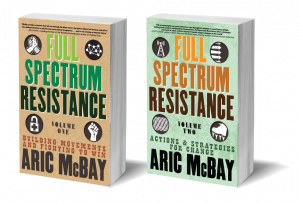
- AbovegroundPeople or groups which operate openly, or without strict secrecy (contrast with underground.)
- Action(1) An event or tactic; (2) a way to achieve change; action can exist on a spectrum from direct to indirect (see “Taxonomy of Action” in Chapter 3, p. xx).
- ActivistA resister; someone who takes action on a cause that is important to them, possibly as part of a group or movement.
- AnarchismThe rejection of systems of coercive control and authority in favour of voluntary organization, mutual aid, and participatory decision-making. Politically, the polar opposite of fascism and authoritarianism. Contrary to popular perception
- AnarchistOne who believes in anarchism.
- ApartheidA violent system of racial segregation and control, separating people on the basis of race for the housing, jobs, transportation, and social relationships. Generally referring to the system of South African apartheid which was institutionalized from 1948 to 1991.
- CadreThe person (singular) or people (plural) who carry out the basic organizational functions of a resistance movement; usually trained and dedicated. They are often professional organizers, the backbone of a resistance movement. (See also leaders and combatants.)
- CampaignAn effort to create social, political, or economic change, usually of a set duration and with a specific attainable goal. A campaign typically consists of an escalating series of actions combined with organizing, mobilization, and communication (among other capacities).
- CapitalismA term that emerged from the French Revolution to refer to the exploitation of the poor by the rich. In capitalism, the wealthy become the dominant force in society, and they change the rules to make it easier for them to get rich at the expense of everyone else. While the term was meant to criticize this exploitation, twentieth century capitalists took the term for themselves.
- Co-optWhen threatened, the powerful will sometimes try to appropriate the cause—or control the organization—of a movement that opposes them. A group that is co-opted may still use the language of resistance, but it will serve people of privilege instead of challenging them.
- CoalitionAn alliance of different groups and organizations to purse a common goal or campaign. Often temporary rather than permanent.
- COINTELPROThe FBI’s COunter INTELilligence PROgram, which used surveillance, dirty tricks, and systematic violence to try to quash liberation movements in the US and to turn them against each other, officially ended after the programs exposure in the early 1970s. (See Chapter 9.) Also used to refer to similar programs in the US and other countries.
- ColonialismA system by which an empire can dominates and exploit other nations through means including military force, the pillaging of resources, slavery and forced labour, cultural assimilation, economic domination, political control, or by displacing native peoples with settlers.
- CombatantAn organizational or movement role; a person who engages in direct confrontation and conflict against systems of injustice; a militant.
- CounterintelligenceEfforts to thwart the intelligence efforts of an opponent, which could include protection against espionage, infiltration, or assassination. Also used for active attempts to disrupt other organizations; see COINTELPRO.
- DissidentA person who believes differently from those in power; a person who believes that prevailing social, economic, or political systems are wrong or unjust. (The challenge for dissidents is to take action and to become resisters.)
- ForceIn contrast to (or in combination with) persuasion, resistance movements generate different kinds of force to disrupt systems of power and induce change. There are many kinds of force, including economic force, political force, social force, and physical force. Force is not synonymous with violence.
- GrassrootsA style or organizing which is “bottom up” and rooted in local communities, participatory decision-making, and collective action (as opposed to “top-down” styles coordinated by centralized elites or powerful organizations).
- Guerrilla warfareA style of conflict in which small groups of armed combatants use sabotage, ambush, mobility, and other techniques to fight a larger conventional military. A form of asymmetric conflict (in which one side has much more military power).
- InfiltratorOne who joins a movement under false pretenses, usually on behalf of a government or intelligence entity, to gather information and sow discord. If their purpose is also to provoke reckless and counter-productive action, they are an agent provocateur.
- IntelligenceKnowledge that helps a movement make decisions, maximize limited resources, and plan and carry out actions; intelligence is information plus analysis. Intelligence is mostly about the opposition, but can also be about allies and the field of conflict. (See Chapter 8.)
- LeaderThose who inspire and organize a movement, and who often make or facilitate decisions; they often do this in public (in contrast with cadres, whose work is often in the background). While in guerrilla groups a leader may exercise command and control, leaders in grassroots groups tend to lead by persuasion and example.
- LGBTQ+An abbreviated acronym that alludes to a vast diversity of sexuality and gender expression and peoples including lesbian, gay, bisexual, transgender, queer, questioning, genderqueer, non-binary, intersex, two-spirited, and asexual, among many others.
- LiberalSeeking reform within existing systems, rather than radical change and the fundamental restructuring or overturning of dominant power structures. While reforms of existing power structures can produce important incremental changes, many liberals also benefit from the privileges those structures provide; that comfort can cause liberals to oppose substantial change. (See “The Liberal Class” in Chapter 2.)
- LobbyingAn attempt to convince those in power to change their actions, hearts, or minds, usually through persuasion and rational argument (in contrast with the use of economical, physical, or social force).
- LogisticsA capacity of movements that involves moving people and stuff, and providing people with the resources, equipment, and services they need. Sometimes it’s divided into “movement, materiel, and maintenance.” (See Chapter 10.)
- MilitantA person who works for rapid change by trying to confront injustice via struggle, disruption, and conflict. (Contrast with moderate.)
- MobilizeTo bring into action people who are already sympathetic to a cause or movement. To mobilize people is to take them off “the path of least resistance” and encourage them to exercise their power to challenge systems of injustice.
- ModerateA person who works for change through communication, dialogue, compromise, and gradual or incremental progress. (Contrast with militant.)
- MovementA collection of overlapping organizations, groups, and individuals, all working toward some roughly common goal of social, political, or economic change. Strong movements are diverse and able to take collective action.
- NonviolenceA principle of action whereby resisters avoid physically harming their opponents; this may be for ethical reasons (e.g., “violence is wrong and we shouldn’t create more of it”) or strategic reasons (e.g., “we are outgunned and don’t want to provoke a physical fight we can’t win; adhering to nonviolence will give us the moral high ground”). Nonviolent resisters focus on other ways of disrupting systems of power (e.g., civil disobedience or blockades). While nonviolent resisters avoid harming people in positions of power, those resisters are often put in danger of experiencing violence themselves.
- Operations(1) In campaign planning, operations is the middle level between detailed, low-level tactics and long-term, high level strategy.
- OppressionA system of power in which some groups of people are marginalized, disempower, or subordinated to give benefits or privilege to the oppressor group. Types of oppression include racism, sexism, homophobia, classism, and many others.
- Organize(1) To take isolated or scattered individuals and bring them together into groups and movements that can undertake collective action; (2) in labour unions, especially, to recruit new union members.
- OrganizerAn activist or resister who works to develop resistance capacity and engage and mobilize people into broader movements or campaigns.
- PropagandaCommunication meant to promote a cause or change beliefs. Some dictionaries define propaganda negatively as “biased” in contrast with “objective” information like news broadcasts. However, many radicals treat the word “propaganda” as neutral, recognizing that supposedly objective information sources like news broadcasts, educational materials, or government statements usually have their own forms of bias.
- RadicalSeeking profound change in society (from Latin radix meaning “root”). Radicals want to restructure society in fundamental ways, and historically have worked dismantle or abolish systems of power like apartheid, patriarchy, and slavery. (Contrast with liberal.)
- Resistance movementA movement working to challenge, disrupt, and dismantle systems of oppressive power. (Contrast with revolutionary movement.)
- ResisterOnce who takes action to challenge, disrupt, and dismantle systems of oppressive power. (In contrast with dissident.)
- Revolutionary movementA movement which goes beyond disrupting or challenging systems of power, and attempts to put in place new forms of power or social organization based on their revolutionary ideologies.
- Security(1) Approaches or techniques used to try to keep resisters safe from reprisals or repression, or to reduce risks involved in resistance. (2) May also refer to “security culture,” a specific set of rules used by some activists (see p. xx).
- Strategy(1) A particular approach used to resistance, e.g., “a strategy of direct confrontation.” (2) The planning and coordination of conflict or resistance movement at a high level and over the long term.
- SupporterA person who believes in the goals of a movement and helps to advance their cause their moral support (e.g., speaking in favour of the movement and its work) or material support (e.g., donations or volunteer time). Supporters may be auxiliaries; they may not be full participants in a movement (see also cadres, leaders, combatants).
- Symbolic actionTypically, an action that shows discontentment against those in power without actively disrupting systems of power. The term “symbolic action” is also used by many radicals to criticize an action they see as ineffective. (This is a slippery term; for a better system, see discussion on decisive, shaping, and sustaining actions, explored in Chapter 11: Actions & Tactics.)
- SympathizerA person who agrees with the general goals of a movement, but doesn’t yet take action to directly support or participate in that movement.
- Tactic(1) A particular way of taking action; e.g., a blockade is a tactic. (2) Detailed planning and coordination of specific actions. (Contrast with strategy.)
- TargetThe person, place, or thing at the focal point of an action or tactic.
- UndergroundPeople or groups that organize and act in strict secrecy. Underground groups tend to be compartmentalized and use a firewall to separate themselves from aboveground (e.g., open or public) groups. See p. xx.
- ViolenceInjury to a living creature (in contrast with damage to property).


